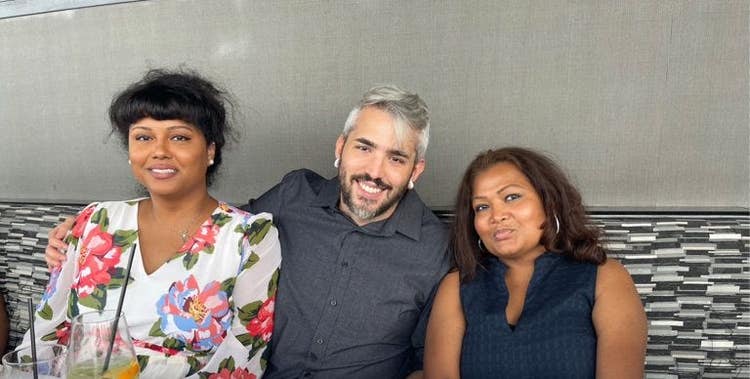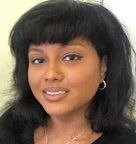Her early experiences with mental health led her to nursing. Now she credits nursing with saving her life.

Kassidy Singh feels as if she was predestined to help vulnerable populations. Even still, she never knew how far she’d get. At 19 years old, working as an LPN, she never imagined that she would someday earn her Doctor of Nursing Practice-Nurse Practitioner degree with a focus on psychiatric mental health.
Nursing both changed and saved Kassidy’s life when, during her psychiatric rotations, she learned more about gender dysphoria. Moving forward in her career, she now has an opportunity to help others through difficult times as she reflects on her own personal and professional journey.
“Nursing has always been my saving grace through all my trials and tribulations,” Kassidy explains. “Undoubtedly, nursing saved my life, and I am willing, ready, and now able to dedicate my life to leading the future of nursing.”
Looking back, Kassidy can see that the seeds were planted for her to develop an interest in the field of mental health early on. When she was growing up, her brother was diagnosed with a rare genetic neurodevelopmental condition called Williams syndrome.
“My relationship with him in many ways gave me patience and helped me to have a passion for wanting to help others,” Kassidy says. “People who struggle with day-to-day things.”
Her experience with her brother and other family members taught her that not every person’s mind works in the same way. She also had uncles who experienced symptoms of psychosis — who saw and responded to people and things that weren’t there.
“I was initially scared,” Kassidy explains, “but from those experiences, I learned that it’s not scary. They are just ill and experiencing something that I am not. In many ways, that has been an advantage to me because I’ve worked with schizophrenic patients, bipolar patients, and people who are psychotic, and it doesn’t scare me. I’ve still found a lot of treatment providers are very afraid.”
Not only did Kassidy’s upbringing instill in her a natural empathy toward people with psychiatric disorders and neurodivergent conditions, but it also influenced her career choices — including which branch of nursing she would focus on and how she approaches patient care. Kassidy also credits Maryville Online for getting her where she needed to be.
“I would recommend Maryville because Maryville is really going to elevate you to the doctoral level of thinking as a nurse,” she says. “Throughout this academic journey, my eyes have really been opened to how I can benefit my patients.”
Discovering better care for herself through caring for others
Kassidy’s mother lived with a substance use disorder throughout Kassidy’s childhood, so she took on the role of a parent and caregiver to her younger siblings. But there came a point when she realized that she needed to focus on pursuing her goals. At that time, she thought she wanted to become a psychologist to focus on mental health, but her aunt, a trusted mentor, began to steer her in the direction of becoming a licensed practical nurse (LPN).
“I didn’t really know what [being an LPN] meant,” Kassidy says. “My only interactions with nursing were, like, a school nurse or going to the doctor. I didn’t realize that nursing was so diverse in where you can work.”
At 18, Kassidy enrolled in an LPN program where she learned the fundamentals of nursing. By the time she completed her psychiatric rotations, she also learned a great deal about herself. Kassidy had questioned her gender identity her whole life, but she didn’t know about gender dysphoria until that point.
“During my psychiatric rotation, we learned about the different types of gender expressions,” she says. “It was my first exposure to what those terms meant…and I was like, ‘wow, I didn’t know that this was a thing.’ I just thought that I was going through something that nobody else went through.”
After learning that gender dysphoria is treatable and that she could transition, Kassidy started to present herself as more feminine. She let her hair grow and began experimenting with makeup. When her aunt suggested that Kassidy only present as male when she was at work out of concern that Kassidy would face discrimination, Kassidy took her advice. But when she tried to present as a male, it created more confusion in her workplace. Not only did patients and coworkers express uncertainty about how to address her, but she also experienced discrimination, just as her aunt had predicted.
During her time in pediatric home care, one of the parents asked the agency not to send Kassidy back to their home because they didn’t feel their children were safe with her. Kassidy was devastated. She also experienced bullying and harassment and believes that she was denied job opportunities because of how she looked and presented herself. Because of this discrimination, Kassidy decided to undergo medical transition to become more female passing.
“I haven’t faced much discrimination since I changed my name legally and present as female. But at the beginning, it was a very different story,” she explains.
Those difficult times are part of why she feels as if she’s been on the right career and academic path. Her entire experience, from discovery to discrimination to transition, has informed her patient care.
“I enjoy the times I interact with other transgender people, and they’re my patient, and I can practice positive disclosure where I can say to them, “Oh, did you know that I am transgender? You’re not the only one, and I’m in this position, and anything is possible,’” she says.


It’s the rain that makes rainbows possible
Kassidy failed at her first attempt to become an RN because she tried to rush through the program.
“You can’t have rainbows without the rain they say. You must go through the tough stuff to become a better nurse,” she says, reflecting on her academic and career path.
She knows that feeling like a failure is a tough hurdle to overcome for everyone, and she has advice for students who might be struggling during their DNP program.
“I wanted to give up plenty of times,” she says. “In those moments, what helps me is focusing on what I really love about nursing, which is patient care — helping people. Being of service. In those moments where I felt like I wanted to give up, I had to remind myself of my career goals and what I needed to do to accomplish them.”
In addition to her resolve and her willingness to put in the hard work, Kassidy credits her perseverance and success in the DNP program to Maryville.
“This is the third online program I’ve done, and it has been the best experience as far as online schools,” she says. “The material is taught very well. You have tremendous support from the teachers and your academic advisor.”
Transforming her patient care protocol through education and her scholarly project
Kassidy credits Maryville’s psychiatric mental health concentration curriculum with changing how she thinks about nursing.
“I have a mature view of nursing. I really haven’t gotten to this point before,” she says. “Maryville taught me the political aspects that trickle down into patient care and the financial aspects that trickle down into patient care. The ethics. There’s so much that goes into that bedside nursing … I have such a greater, more mature, more well-rounded view of healthcare, patient care, and nursing since I’ve been doing this DNP program.”
Part of Maryville’s Doctor of Nursing Practice curriculum involves what is called a scholarly project. For Kassidy’s psychiatric and mental health concentration scholarly project, she focused on a critical aspect of substance use disorder that often goes neglected in treatment: trauma.
After working in substance use disorders (SUD) for about 13 years she understands how trauma can impact the etiology and prognosis of the disorder.
“For my scholarly project, I wanted to begin a process that catalyzed the incorporation of trauma-focused interventions into the patient’s plan of care,” she explains. “My project’s intervention involves screening for post-traumatic stress disorder (PTSD) at admission on all newly admitted clients who report a positive trauma history. PTSD is highly comorbid with SUD. By screening for PTSD, my project is beginning the process of incorporating trauma-focusing interventions into patient treatment planning, as those screened positive are referred for psychiatric services.”
As someone who has experience at so many levels and through so many lenses of nursing, Kassidy says that she can attest to the positive impact that her Maryville coursework has had on her practice. The impact goes beyond her scholarly project shaping how she treats patients: She also knows that with a DNP, she can pursue a career as a nurse educator and open a private practice, and she is setting new goals to do just that.
“I now have a deeper understanding of nursing,” Kassidy says, “and I am excited and ready to catalyze change in healthcare.”
“If you really want it, go for it. Don’t let anybody tell you that you’re not smart enough or good enough to do so.”
If you’re ready to see how Maryville Online can help you be brave and pursue your educational and professional goals, we’re here for you. Check out our online bachelor’s degrees, master’s degrees, and doctorate degrees, or schedule a call with an advisor today.